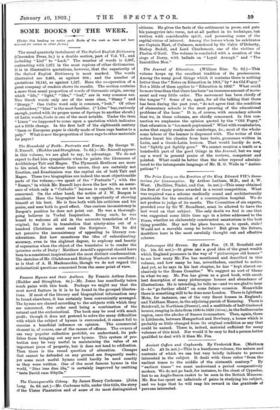The Household of Faith: Portraits and Essays. By George W.
E. Russell. (Hodder and Stoughton. 7s. 6d.)—Mr. Russell appears in this volume, we are glad to say, to advantage. We do not expect to find him sympathetic when he paints the likenesses of Archbishops Tait and Magee. The Plymouth Brethren are more to his mind, for whatever their errors, they are certainly not Erastian, and Erastianism was the capital sin of both Tait and Magee. These two biographies are indeed the most objectionable parts of the volume,—we speak of the " Portraits " ; with the "Essays," in which Mr. Russell lays down the law with an assur- ance of which only a " Catholic " layman is capable, we are not concerned. On the other band, the notice of J. W. Burgon is excellent. Here the biographer has an opportunity of showing himself at his best. He is free both with his criticism and his praise, and uses both to good effect. One curious inconsistency in Burgon's position he does not point out. He was a thorough- going believer in Verbal Inspiration. Being such, he was bound to welcome all aid in the accurate translation of the original, for it is in translation that ninety-nine out of a hundred Christians must read the Scripture. Yet he did not perceive the inconsistency of appealing to literary con- siderations. But how monstrous the idea of subordinating accuracy, even in the slightest degree, to euphony and beauty of expression when the object of the translator is to render the ipsissima verba of Deity ! Matthew Arnold's approval should have been to a consistent inspirationist the most distinct condemnation. The sketches of Mr. Gladstone and Bishop Westcott are excellent ; so is that of A. H. Mackonochie, though we do not regard the ecclesiastical questions concerned from the same point of view.






































 Previous page
Previous page